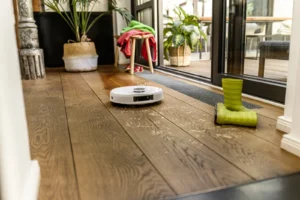
„Wiele dzieci chciałoby od swoich rodziców otrzymać po prostu czas”. Psycholożka Monika Deja o prezentach pod choinkę
Klaudia Kierzkowska: Prezenty pod choinkę są teraz tematem numerem jeden. Rodzice kupują upominki, niekiedy kosztowne prezenty, by sprawić dziecku przyjemność. Zastanawiam się, czy kosztowne prezenty są dobrym pomysłem?
Monika Deja: Sądzę, że pod nazwą „kosztowe prezenty” mogą kryć się przynajmniej dwa rodzaje upominków. Pierwszym z nich są przedmioty czy sprzęty rozwijające wiedzę, służące realizacji pasji dziecka czy nawet całej rodziny – rower, narty, lornetka, plecak turystyczny. Rodzice korzystają z okazji, jaką są Święta Bożego Narodzenia, by obdarować swoje dziecko czymś droższym, co jednocześnie pozytywnie wpłynie na jego rozwój i zostanie dobrze wykorzystane.
Drugim z nich będą drogie zabawki czy gadżety elektroniczne, które są akurat modne, które dziecko zobaczyło w reklamie telewizyjnej i zamarzyło o tym, by je posiadać. Niekiedy kupujemy dziecku drogie zabawki dlatego, że są one lepszej jakości, solidniejsze, tak szybko się nie zepsują.
Kupowanie zatem droższych prezentów nie zawsze jest złe. Ważne, z jaką intencją to robimy.
A jakie mogą być te intencje?
Wielu rodziców przyznaje, że kupując dzieciom drogie zabawki, próbuje wypełnić braki, których sami doświadczyli w dzieciństwie. Współcześni trzydziesto- czy czterdziestolatkowie to pokolenie, które znajdowało pod choinką sweter, kapcie, czasami książkę. Nieliczni mieli to szczęście, że mogli bawić się klockami LEGO, lalką Barbie czy zdalnie sterowanym samochodem. Dziś często powtarzają: „Ja w dzieciństwie tego nie miałem, to teraz kupię to mojemu dziecku”. Możliwość sprawienia takiego prezentu sprawia radość bardziej rodzicowi, ale również i dziecku.

Monika Deja /fot. archiwum prywatne
Czasami drogie prezenty to próba wynagrodzenia swojej latorośli, np. braku czasu, swojego zapracowania. Innym razem ulegamy presji dziecka, które prosi o daną rzecz, bo „wszyscy to mają, tylko nie ja”. Nie chcemy wtedy, by syn czy córka odstawali od rówieśników, by byli odrzuceni z powodu nieposiadania jakiegoś gadżetu.
Dostrzega pani jakieś zagrożenie płynące z obdarowywania dzieci kosztownymi prezentami?
Pierwszym i najważniejszym zagrożeniem jest to, że maluch zacznie traktować drogie zabawki jako coś oczywistego. W konsekwencji nie będzie umiał doceniać prezentów o mniejszej wartości czy na przykład tych zrobionych samodzielnie. Tłumaczenie dziecku, ile kosztuje dana rzecz, jak długo trzeba na nią pracować czy też poinformowanie go, że do drogiej zabawki musi dołożyć z kieszonkowego, uczy go odpowiedzialności finansowej i wartości pieniądza.
Z kolei bezrefleksyjne kupowanie zabawek tylko dlatego, że „koledzy mają”, może zrodzić w dziecku przekonanie, iż na relację z drugim człowiekiem trzeba sobie zasłużyć, np. wyglądem, posiadaniem, pozycją społeczną. To bardzo niekorzystnie wpływa na poczucie własnej wartości dziecka.
Zdaję sobie sprawę z tego, że tłumaczenie kilkulatkowi tego, że nie rzeczy materialne są ważne, kiedy doświadcza on wyśmiewania czy odrzucenia ze strony kolegów, jest trudne. Warto jednak uczyć już od najmłodszych lat, co jest prawdziwą wartością człowieka. A na pewno nie są nią dobra materialne.
Zastanawiam się, czy może dzieci, zamiast kosztownego prezentu wolałyby dostać coś niematerialnego?
Wiele dzieci chciałoby od swoich rodziców otrzymać po prostu czas. Czas poświęcony na wspólną zabawę czy wycieczkę. Czas, kiedy rodzic z uwagą je wysłucha i nie będzie spoglądał co chwilę na telefon. Czas na wspólny niespieszny posiłek, czy wieczorne czytanie bajki na dobranoc. Czas na wspólne gotowanie czy wygłupy. Obecności rodzica przy dziecku nie zastąpi żadna, nawet najdroższa zabawka!
Jakie zatem prezenty będą najbardziej odpowiednie dla dzieci?
Sądzę, że warto pomyśleć o takich podarkach, które przede wszystkim pozwolą dziecku rozwijać pasję i talenty. Zachęcam, by jednocześnie przemyśleć, czy te zabawki, które zwykło się nazywać edukacyjnymi, rzeczywiście pełnią taką funkcję. Nie każdy przedmiot, który wydaje dźwięki czy świeci, jest od razu edukacyjny. Prawdziwa rozwojowa zabawka wspiera dziecko w kształtowaniu motoryki małej, koordynacji wzrokowo-ruchowej, myślenia logicznego, czy wyobraźni przestrzennej. Pobudza także kreatywność i zachęca do eksploracji otoczenia.
Takimi edukacyjnymi przedmiotami są często zabawki z naszego dzieciństwa – skakanka, klocki, gry planszowe czy zręcznościowe. Poza wpływem na sferę fizyczną czy poznawczą dziecka mają jeszcze jedną korzyść – pozwalają budować relacje i doskonalić radzenie sobie z emocjami.
Jak taka zabawa wpływa na rodzinne więzi?
Podczas takich aktywności spędzamy wspólnie czas, śmiejemy się, rozmawiamy. Mamy okazję dzielić się przeżyciami, opowiedzieć o ważnych dla siebie sprawach i budować wspólne, pozytywne wspomnienia. Kiedy dziadkowie czy rodzice opowiadają, jak sami bawili się podobnymi zabawkami, buduje to w dziecku poczucie zakorzenienia w przeszłości oraz kształtuje jego tożsamość. Gdy maluch przegrywa, w bezpiecznych dla siebie warunkach uczy się radzenia sobie z porażką. Wspólna zabawa to także okazja dla rodziców, by modelować prawidłowe zachowania społeczne, takie jak np. gratulowanie wygranej czy okazywanie radości z cudzego sukcesu.
Kiedy pomyślę o Bożym Narodzeniu ze swojego dzieciństwa, jednym z pierwszych wspomnień jest rodzinne układanie puzzli. Razem z siostrą dostałyśmy układankę, złożoną z 600 elementów. Pamiętam, że przez całe święta mama, tata i my dwie byliśmy pochyleni nad puzzlami. W dzieciństwie pod choinką znalazłam wiele różnych prezentów, także droższych niż opakowanie puzzli, ale je pamiętam najbardziej, właśnie ze względu na czas spędzony razem, śmiech i bliskość.

A co niematerialnego jako rodzice możemy podarować swojemu dziecku?
Można pomyśleć o prezentach, na których skorzysta cała rodzina – bilety do kina, rodzinne wyjście do parku trampolin czy na jakieś wydarzenie sportowe, wspólna wycieczka. Dobrą alternatywą jest też możliwość spędzenia czasu tylko z jednym rodzicem, np. córka może wyjść na lody z tatą, a pozostałe rodzeństwo zostaje w domu z mamą. Takie spotkania są niezwykle wartościowe – budują w dziecku poczucie bycia kimś ważnym, są więziotwórcze, dają okazję do rozmowy, która być może nigdy by się nie odbyła w większym gronie.
Bardzo doceniam też prezenty w postaci talonów, np. na wspólne gotowanie tego, na co dziecko ma ochotę czy też na jakąś aktywność, którą ono zaproponuje. Maluch może je wykorzystać, kiedy chce, a rodzic spełnia wtedy prośbę dziecka.
Czy takie niematerialne prezenty także pomagają zbudować więź między dzieckiem a rodzicem?
Oczywiście! To świetna okazja do wspólnego spędzenia czasu, rozmów, zwierzeń, dzielenia się trudnościami, ale i radościami. To też budowanie wspólnych doświadczeń i tożsamości rodziny. Taki prezent i sposób spędzenia czasu dłużej zostaje w pamięci malucha niż samotna zabawa nawet najdroższą zabawką.
Dlaczego ta więź jest tak ważna?
Więź z rodzicami jest fundamentem, na którym budujemy w życiu wszystkie inne relacje. Dla dziecka model więzi z rodzicami jest modelem dla pozostałych związków interpersonalnych, jakie w przyszłości stworzy. To w rodzinie uczymy się, czy jesteśmy ważni i kochani, czy jednak nie zasługujemy na uwagę, czas, szacunek i akceptację. Efektem tego jest sposób, w jaki spostrzegamy samych siebie, innych ludzi, wydarzenia, których doświadczamy. Pozytywne, bezpieczne przywiązanie z rodzicami skutkuje tym, że dziecko z ufnością i pewnością siebie eksploruje otoczenie oraz wchodzi w relacje. Potrafi prosić o pomoc i zatroszczyć się o swoje potrzeby. Jest przekonane o własnej wartości i szanuje innych ludzi.
Relacje rodzinne z reguły są tymi, które trwają najdłużej, a dom rodzinny jest miejscem, do którego wracamy (fizycznie czy też tylko mentalnie) w trudnych chwilach. Jednak jest to możliwe tylko wtedy, kiedy doświadczyliśmy tam bezwarunkowej miłości i ciepła wzajemnych więzi.
Zastanawiam się, czy dziecko nie obrazi się, kiedy zamiast samochodu zdalnie sterowanego „dostanie” wycieczkę rowerową i piknik z rodzicem?
Jeśli ten niematerialny prezent będzie dostosowany do zainteresowań i potrzeb dziecka, na pewno nie wywoła w nim uczucia zawodu czy frustracji. Będzie za to świetną okazją do wspierania jego rozwoju i budowania wzajemnych relacji i wspólnych wspomnień! Pamiętajmy, że jakość prezentu nie zawsze idzie w parze z jego ceną, a niekiedy to prezent niematerialny okazuje się być tym bezcennym.
dr Monika Deja – psycholog, specjalista z zakresu wczesnego wspomagania rozwoju dziecka i wczesnej interwencji z wykorzystaniem metod neurofizjologicznych, ukończyła kurs terapii ręki. Jest zatrudniona na Wydziale Psychologii Uniwersytetu Kazimierza Wielkiego w Bydgoszczy i prowadzi zajęcia głównie z psychologii rozwoju człowieka. Pracuje także w przedszkolach z dziećmi z opinią o wczesnym wspomaganiu rozwoju i orzeczeniem o kształceniu specjalnym. Jest autorką licznych publikacji naukowych i popularnonaukowych z zakresu psychologii rozwoju człowieka i psychologii rodziny. Na Facebooku i Instagramie prowadzi fanpage „Psychologia w przedszkolu”.








































